- Bernard Preston homepage
- Happy Tum
- What Foods Prevent Parkinson's Disease
What foods prevent Parkinson's Disease?
What foods prevent Parkinson's Disease, the fastest growing neurodegenerative condition? Fava beans are the only source of pharmaceutical quantities of L-dopa.
You almost certainly know someone who has Parkinson's Disease; or has died from the condition. An unknown toxic chemical, probably a solvent poisoned a nucleus in the brain called the Substantia Nigra; it can no longer produce dopamine, an extremely important neurotransmitter.
The chemicals used to preserve meat have also been fingered.
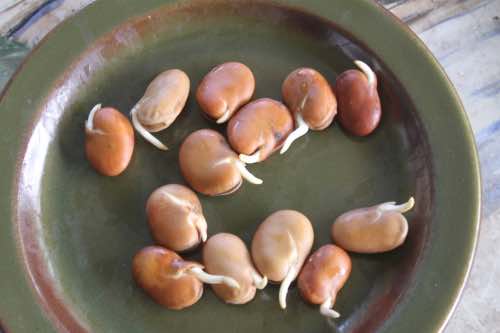 Sprouting broad beans are the only rich source of L-dopa
Sprouting broad beans are the only rich source of L-dopaThere are "compelling" reasons to believe that what we eat will profoundly affect whether we get the disease or not; and how fast it will progress.
The health of the gut is supremely important; there is strong evidence that species of bacteria in the colon initiate the production of the nasty a-synuclein protein that aggregates in the brain causing PD; and is carried there by the Vagus Cranial Nerve.
"Although randomized controlled trials are still limited, the epidemiologic evidence supporting dietary interventions is compelling."
- Dr John Duda, national director of the Parkinson's Disease research centres.
What foods prevent Parkinson's Disease is a pressing question; another equally important factor is what solvents are causing this condition to grow in leaps and bounds in industrialised countries and how can we avoid them?
For example two million people over the age of 65 in China have PD; nearly 2% of the elderly.
The health of the gut
“There are reasons to believe that a-synuclein accumulation may start in the gut."
- Dr John Duda
The healthy gut contains an astonishing 2kg of friendly bacteria, viruses and yeast cells; and other less well known creatures. Modern grocery store food, ultra-refined and loaded with toxic chemicals disturbs this balance in the colon.
It then becomes an unfriendly environment for the bugs that produce the very important "short-chain fatty acids," encouraging those that cause generalised inflammation and particularly the bacteria that promote a-synuclein protein accumulation.
Fibre
Those friendly bugs are utterly dependent on fibre and resistant starch, carbs that are not absorbed in the small intestine, instead reaching the colon for food.
The modern industrialised diet is focused rather on those carbs that are easily digested in our very long small intestines. Little reaches the large bowel for the good bacteria; and simultaneously make us obese and provoking type-2 diabetes.
Only 5% of those eating typical grocery store food are getting the recommended dietary allowance of fibre; at least 30 grams. This creates an environment in the gut that promotes those pathogenic bacteria that cause inflammation and a-synuclein synthesis.
This fibre makes one other important contribution. It is well known that those with Parkinson's Disease suffer from dreadful constipation; in fact it may be part of the underlying cause of PD. But in any event dopamine is the precursor of the catacholamine hormones that innervate the muscles which regulate the gut.
Two-thirds of PD patients suffer from debilitating constipation. General advice is drinking more water, walking after starchy meals and stool softeners such as stewed prunes; and beetroot.
Then there are the added complications of all the diseases of the gut associated with constipation. It is no coincidence that colo-rectal cancer rates are also climbing at an alarming rate, especially in younger people.
SUMMARY
- Eat a many-coloured salad every day.
- Enjoy several different fruits daily.
- Focus on more whole grains and legumes.
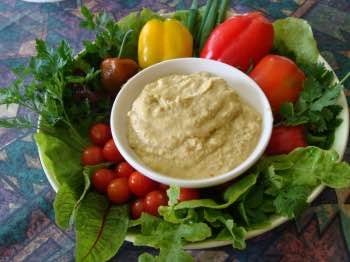 Coloured salads and hummus are rich in fibre
Coloured salads and hummus are rich in fibreLoss of sense of smell
What foods prevent Parkinson's Disease? Loss of the sense of smell diminishes appetite to the extent that one-quarter of patients actually begin to suffer from malnutrition; they become less interested in eating.
General recommendations are the use of strong herbs and spices to evoke any remaining sense of smell; such as garlic, turmeric and probiotics like sauerkraut.
Healthy nut and seed butters, high in calories will help regain weight lost. Tahini for example is one of the prime ingredients of hummus; the chickpeas provide large amounts of fibre too.
Remembering that there is strong evidence that Parkinson's Disease starts in the bowels, this emphasis on nutritious foods is certainly not out of place.
Could we all be learning something from these people? Is not prevention better than a cure for those suffering from constipation that could be the first sign of impending Parkinson's Disease?
Caffeine
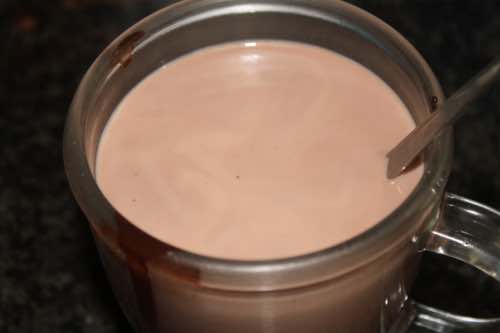 Hot chocolate sweetened with natural honey not sugar
Hot chocolate sweetened with natural honey not sugarParkinson's patients generally have less energy and often feel sleepy; cocoa has many benefits. It gets bad press because it always is consumed with large amounts of sugar to counter the bitterness. The caffeine seems to help with that drowsiness that characterises those suffering from the disease. Could you instead sweeten it with raw honey that does not have a high glycemic effect?
Coffee too seems to help with the drowsiness that affects those suffering from Parkinson's Disease. The physiology is not well understood but hey, you don't have to know how a computer works to use it.
Small amounts of coffee and cocoa seem to help those suffering from Parkinson's Disease. But don't spoil that benefit by sweetening it with large amounts of sugar.
Probiotic foods
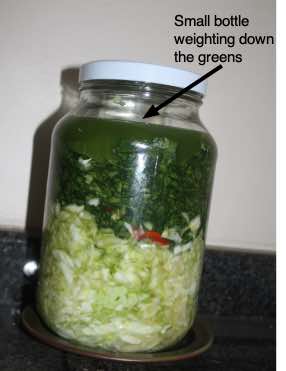 Kimchi made with added spinach
Kimchi made with added spinach"Numerous studies implicate gut microbiome dysbiosis as a pathogenic mechanism in PD; with gastrointestinal symptoms often predating motor signs."
- Dr John Duda
Plenty of dietary fibre is not going to be enough for those who have been suffering for a long period with an unhappy tum. Restoring a broad spectrum of friendly bugs requires a return to probiotic foods made in your own kitchen. There are many.
Kimchi is a variation of the sauerkraut enjoyed by the German and Polish peoples; and many others world-wide of course. It is not unlike coleslaw but has been fermented for a few days; when you see it beginning to bubble and burp then you know it's ready for consumption.
One can add many other vegetables for greater nutrition; for example the dark-green leafy spinach in the graphic above. Then you will also get protection against night leg cramps from the vitamin K2.
Researchers emphasize the importance of not only the weight of these friendly bugs but also a very wide spectrum. Taking a large dose of just a few bacteria in a pill regularly is not helpful; occasionally is probably fine.
"Let thy food be thy medicine and medicine be thy food."
Hippocrates (460 - 370 BC)
What foods prevent Parkinson's Disease?
What foods prevent Parkinson's Disease is a fascinating topic. Of great interest is the regular consumption of broad beans, also known as favas; they are the only source of pharmaceutical amounts of L-dopa.
About two-thirds of those suffering from PD would be better off getting the levodopa from broad beans rather than medication; it has a much smoother effect. Just a couple young pods twice a day would be sufficient.
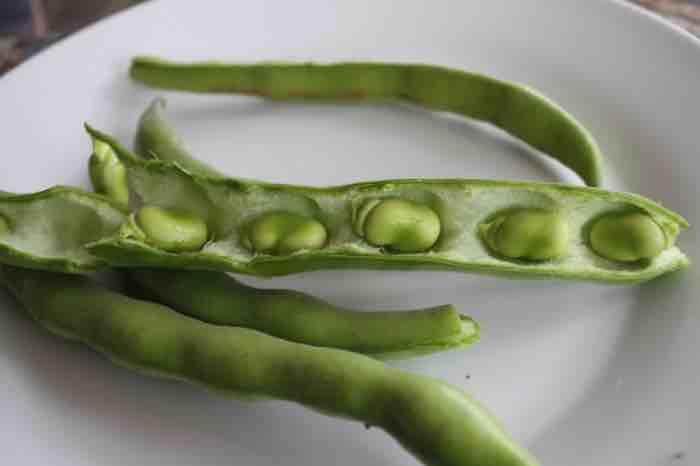 The young pod contains even more L-dopa than the bean
The young pod contains even more L-dopa than the beanYou are most unlikely to find fresh young broad bean pods like these on supermarket shelves; you have to grow them yourself. Old and starchy they are awful.
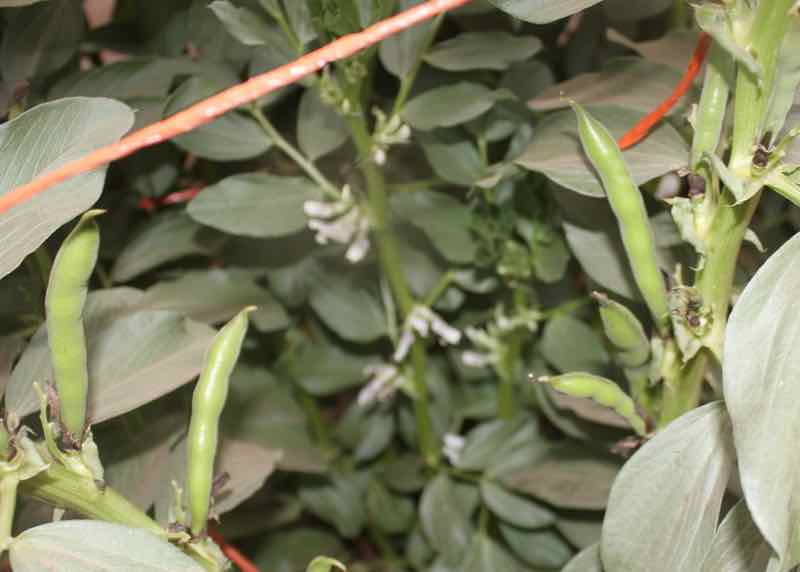 Young broad beans also known as favas
Young broad beans also known as favasTea, tomatoes and eggplant
At least three cups of both green and black tea appear to offer protection against PD.
And so too the Solanaceae family of foods offer 8 years protection against the onset of the nasty motor symptoms; potatoes, tomatoes and peppers for example. However here there are risks from the ecocides often used to grow these vegetables commercially; they have definitely been linked to Parkinson's Disease.
There is strong research showing that those who grow their food are likely to be far more healthy and zestful, often right into their nineties.
New potatoes have the advantage of plenty of fibre, half of the carb is resistant starch with a low glycemic index; they are not fattening.
"There is increasing evidence that exposure to plants and green space and particularly to gardening, is beneficial to mental and physical health."
- Clinical Medicine (PMC6334070)
Antioxidants, carotenoids and vitamins
There is strong research confirming what we already know; that coloured foods rich in antioxidants, carotenoids and vitamins, especially E and C give protection against the disease and progression of the symptoms should you have it.
Vitamin C is found particularly in citrus and peppers; and E in whole grains.
Beta-cryptoxanthin in citrus and lutein in dark-green leafy vegetables are two carotenoids that get special mention when it comes to the neurodegenerative conditions and macular diseases causing blindness.
This all ties in strongly with the four vitamins that if deficient are associated with early frailty syndrome.
Flavonoids
Flavonoids are the compounds that give fruits and vegetables their colours; the purple in berries, the orange in citrus and the red in tomatoes, for example. They are known as functional foods; those that help prevent disease and promote wellness.
They give a 40% protection against Parkinson's Disease. In vitro laboratory tests have shown they can stabilise the formation of more alpha-synuclein and also inhibit pro-inflammatory cytokines.
It has been clearly shown that consumption of 7 or more coloured foods daily, even in small quantities reduces the all-cause of death by a third; that's massive.
What foods cause Parkinson's Disease?
Dr Duda reports that a very strong "meta-analysis" of 28 studies confirms that a diet high in ultra-processed foods has a 56% increased risk of Parkinson's Disease; and a host of other adverse neurologic outcomes such as cognitive decline and stroke.
UPFs take up about 75% of the shelf space in an average grocery store; that would include all commercial bread, most breakfast cereals and processed meat, for example.
The elderly should eat rather more protein but Dr Duda points out that levodopa is a "large neutral amino acid" that would have to compete with that from eggs, meat and dairy products. He recommends taking the medication an hour before or after meals; that would probably apply to those wanting to treat themselves with broad beans too.
Other experts recommend avoiding protein during the day, instead enjoying whole grains, fruit and vegetables; and having their amino acids with supper rather. This questions the sense of Eggs Parkinson's Disease.
There is some evidence that saturated fats may be associated with a higher risk of PD; rather we should be enjoying olive oil, avocados and various seeds; such as flax for example.
Time
Many people complain candidly they just don't have the time to prepare "real food;" and certainly will not grow it themselves.
We have another perspective; then start to consider how much time will be spent in the treatment of chronic degenerative conditions like Parkinson's Disease and type 2 diabetes. Add to that the number of good years of life that are lost and it becomes a no-brainer.
Another thought to be factored in is that real food has to be chewed. Corn on the cob takes 10 minutes to eat; mouthfuls of sauerkraut and true wholemeal bread have to be "fletcherised;" munched 30-odd times.
True wholemeal bread is a very rich source of the vitamin E mentioned above that gives such protection against the neurodegenerative diseases; it is not heavy at all but it takes a lot of chewing. You won't find it on the shelf in the average bakery.
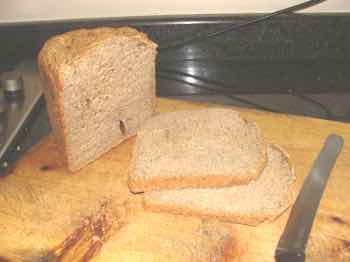 Sourdough bread baked with 100% wholemeal
Sourdough bread baked with 100% wholemealThe big picture
If food is this important in the prevention and management of Parkinson's Disease, do these principles of healthy living not apply to all conditions and in fact life itself?
Make the time
So we either make the time to prepare good food and enjoy leisurely meals or should prepare ourselves for the very real possibility of serious disease that will suck the life out of us.
When browsing use right click and "Open Link in New Tab" or you may get a bad gateway signal.
Newsletter
Our newsletter is entitled "create a cyan zone" at your home, preserving both yourself and Mother Earth for future generations; and the family too, of course. We promise not to spam you with daily emails promoting various products. You may get an occasional nudge to buy one of my books.
Here are the back issues.
- Lifestyle and ideal body weight
- What are ultra-processed foods?
- Investing in long-term health
- Diseases from plastic exposure
- Intensive lifestyle management for obesity has limited value
- A world largely devoid of Parkinson's Disease
- The impact of friendly bacteria in the tum on the prevention of cancer
- There's a hole in the bucket
- Everyone is talking about weight loss drugs
- Pull the sweet tooth
- If you suffer from heartburn plant a susu
- Refined maize meal and stunting
- Should agriculture and industry get priority for water and electricity?
- Nature is calling
- Mill your own flour
- Bake your own sourdough bread
- Microplastics from our water
- Alternative types of water storage
- Wear your clothes out
- Comfort foods
- Create a bee-friendly environment
- Go to bed slightly hungry
- Keep bees
- Blue zone folk are religious
- Reduce plastic waste
- Family is important
- What can go in compost?
- Grow broad beans for longevity
- Harvest and store sunshine
- Blue zone exercise
- Harvest and store your rainwater
- Create a cyan zone at your home
Did you find this page interesting? How about forwarding it to a friendly book or food junkie? Better still, a social media tick would help.
- Bernard Preston homepage
- Happy Tum
- What Foods Prevent Parkinson's Disease
Address:
56 Groenekloof Rd,
Hilton, KZN
South Africa
Website:
https://www.bernard-preston.com